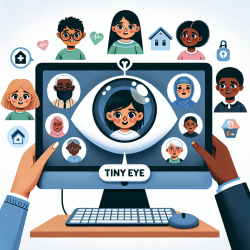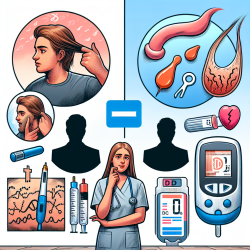Introduction
In the field of speech-language pathology, understanding the broader context of a child's life is crucial for effective intervention. This includes recognizing the disparities that exist in healthcare and social services, which can significantly impact outcomes. The recent research article, Black girls and referrals: racial and gender disparities in self-reported referral to substance use disorder assessment among justice-involved children, sheds light on such disparities, particularly for Black girls involved in the justice system.
Understanding the Disparities
The study highlights a critical issue: Black girls are significantly less likely to be referred for substance use disorder (SUD) assessments compared to their White counterparts. This is alarming, considering the higher prevalence of substance use disorder among justice-involved children (JIC). The research used data from the Florida Department of Juvenile Justice, examining over 12,000 cases to uncover these disparities.
Key Findings
- Black females were 34% as likely to report a history of being referred to SUD assessment as White males and females.
- Disparities are likely due to external factors, including racial and gender biases, rather than procedural failures within the justice system.
- There is a need for culturally relevant and gender-sensitive programs to improve access to services for minoritized adolescents.
Implications for Practitioners
For practitioners in speech-language pathology and related fields, these findings underscore the importance of advocating for equitable access to services. Here are a few actionable steps:
- Advocate for Comprehensive Assessments: Ensure that all children, regardless of race or gender, are thoroughly assessed for SUD when substance use is reported.
- Implement Culturally Sensitive Practices: Develop and utilize assessment tools and intervention strategies that are culturally and gender-sensitive.
- Collaborate with Community Resources: Partner with community organizations to provide holistic support that addresses both communication needs and broader social determinants of health.
Encouraging Further Research
While this study provides valuable insights, it also highlights the need for further research into the intersectionality of race and gender in healthcare access. Practitioners are encouraged to engage in or support research that explores these dynamics, contributing to a more equitable healthcare system.
Conclusion
Addressing disparities in SUD referrals for Black girls is not just a matter of justice but a critical step towards ensuring that all children have the opportunity to thrive. By implementing the findings of this research and advocating for systemic change, practitioners can play a pivotal role in creating better outcomes for all children.
To read the original research paper, please follow this link: Black girls and referrals: racial and gender disparities in self-reported referral to substance use disorder assessment among justice-involved children.










